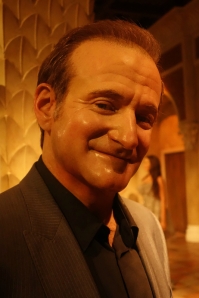“Nano nano.” As a fourth grader, I tried to spread my fingers just like Mork from Ork in order to bid adieu to friends at school. (my right hand, no problem; left hand, I still can’t do it.)
We are awash in a sea of emotions at the stunning news of Williams’ suicide. Like so many funny men, the work of his early years was hysterical and at points raucously crude—symptomatic no doubt of youthful immaturity. As his body of work grew, so did his sophistication, choosiness of roles, and thoughtfulness of his characters. Still always treating us to jovial faces and good-like-medicine laughter, his work became more and more purposeful. Complexity of characters and message are profound in Patch Adams and Dead Poets Society. “O Captain, my Captain!” “Carpe diem! Seize the day, boys.”
So we longingly ask, what goes wrong? How does such a hilarious guy of stardom fall so far emotionally that he chooses to exit? The forensics and toxicology are still being completed. It is well documented that he battled both depression and addiction. Friends have been interviewed, and they confirm that he was struggling, albeit with a seemingly strong support system enfolding him.
None of us, especially those of us with deeply religio-spiritual backgrounds, should rush to hand out diagnoses and snap judgments. Let’s not forget, it was not long ago that Rick Warren’s family faced the tragic loss of their son. Let’s not forget, so many of our extended families have experienced first-hand the ravages of mental illness and suicide—including my own cousin just a few years back.
What can we say? Because God designed us for integrated living, we must resist the urge to compartmentalize, thinking that our mental-emotional health is incidental, a sidebar. If you are struggling with depression and addiction, reach out for hope and help, both to Christ through spiritual mentors and to health professionals—please do it NOW!
What else can we say? Because God wants us to work as his coworkers, in his image (Genesis 1:26-28), we need to balance life better. Work hard, yes, but resist defining our own identities solely on our work success. Here’s where our faith, a deeper trust, has to intersect with our creative good works, pre-ordained by our Maker (Saint Paul, Ephesians 2:8-10). Will we trust him? Don’t let your own identity become so wrapped up with your work outcomes that you descend into the abyss, especially in those seasons when your work is not producing a remarkably fruitful crop. You are so much more than the sum total of your portfolio!
I recently read Irving Stone’s classic biographical novel of Michelangelo.[1] We readily applaud the sculptor-painter’s amazing achievements, but we often fail to recognize the deep agony, work frustration, and overall despondency he faced with each artistic endeavor.
What hope can we find in our own dark moments, when work is less than stellar, when life seems to rot, and we hear those voices from the shadows? Let’s be real real. Most of us are moved by Robin’s tragic story because the psychological tremors hit too close to home, echoing into the depth of our own souls, homes, and workplaces. We all have our own moments and voices that whisper diabolical thoughts in the face of our agony.
Courageously recall, there is indeed an unseen battle. Some will accuse me of over-simplifying, but we dare not miss the essential power of prayer in putting on God’s protective armor (Saint Paul, Ephesians 6:10-20). The biblical leader of workers, master wall builder, Nehemiah, handled his own opposition from critics, the taunting voices, would-be distractions, and impending despair. He replied, “I am doing a great work, so I cannot come down . . .” And then he passionately prayed, “Strengthen my hands.” (Nehemiah 6)
C. Neal Johnson, calling for vigilance in spiritual warfare related to our work-a-day business, asserts:
“There is also a form of prayer called inner healing prayer (IHP). It is an approach to prayer in which an individual can identify and resolve deep-seated emotional issues that have plagued his or her attempts at healthy living . . . Both research data and anecdotal testimonies evidence significant long-term, deep, inner healing as a result . . . Training in how to conduct IHP is highly recommended in order to be effective and to avoid unscriptural activities.”[2]
Let us pray fervently for the Williams’ family and close friends, for peace and strength, hope and comfort. Let us pray for one another, for deep healing in our daily work’s agony and ecstasy.
And by all means, Carpe diem. With Christ’s strength and for his glory, let us make our lives extraordinary!
[1]Irving Stone, The Agony and the Ecstasy: A Biographical Novel of Michelangelo. (Doubleday and Company, 1961).
[2]C. Neal Johnson, Business As Mission: A Comprehensive Guide to Theory and Practice. (IVP, 2009), 450-51.


